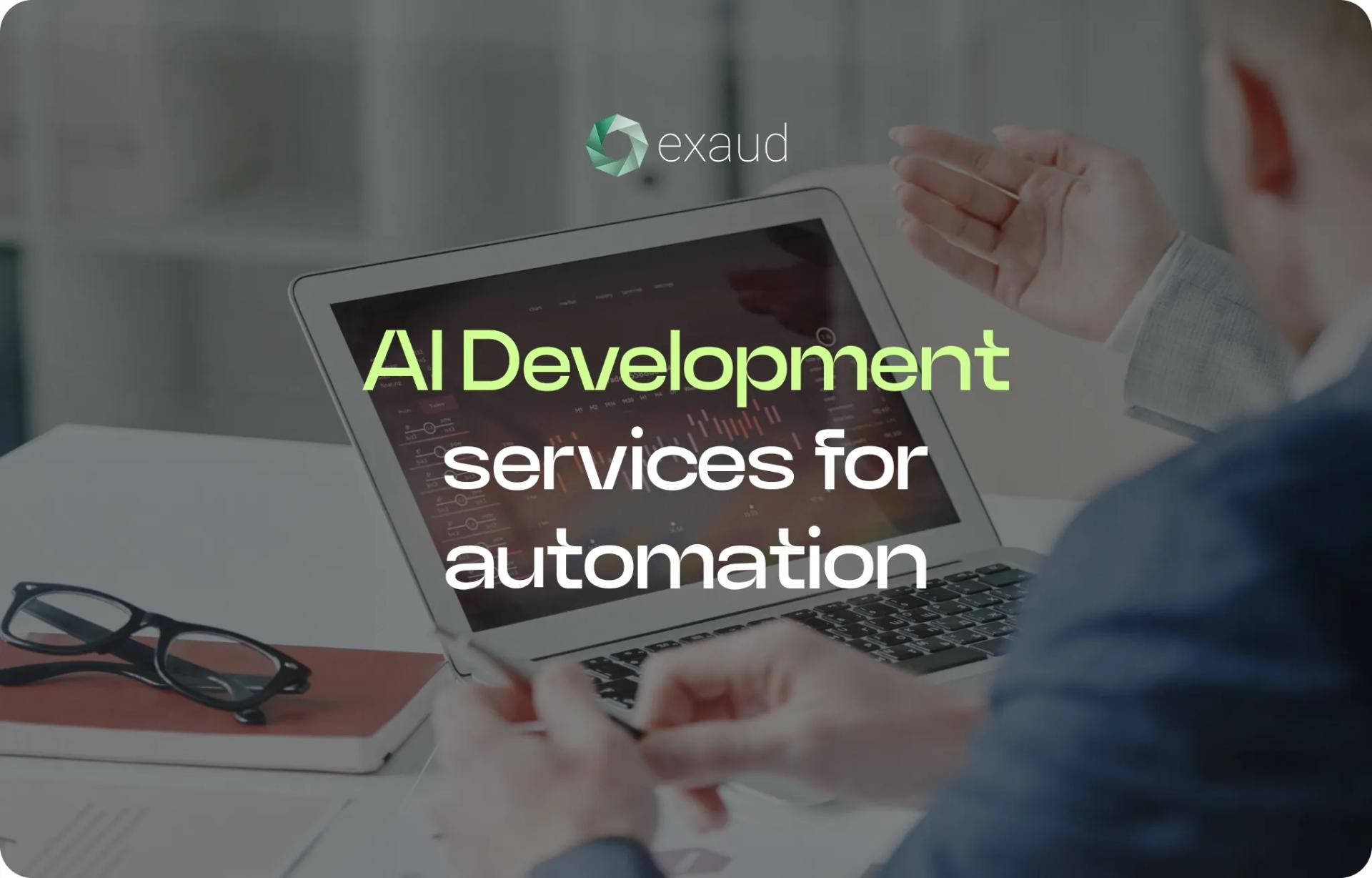Exaud Blog
Blog

AI Development Services for Automation: Streamlining Business Operations
Learn how AI development services can streamline business processes and enhance operational efficiency. Discover key benefits and best practices.Posted onby ExaudArtificial Intelligence allows companies to rethink how work is done: reducing repetitive manual tasks, improving accuracy, and freeing teams to focus on strategy and innovation. By integrating AI development, organizations can go beyond simple process optimization and reshape how they operate.
This article explores how AI-driven automation is helping companies work smarter, reduce manual workload, and strengthen their decision-making processes.
AI Development Services: What Do They Bring to the Table?
When we talk about AI development services for automation, we're referring to the creation of custom AI tools designed specifically to automate business processes. These solutions range from simple machine learning models that improve workflows to advanced systems that control large-scale operations in real time.
These services involve a mix of technologies, such as machine learning (ML), natural language processing (NLP), robotic process automation (RPA), and predictive analytics, all of which work together to transform traditional, manual operations into data-driven and autonomous systems.
With AI at its core, businesses can leverage intelligent systems that learn from data, predict future trends, and automate processes with minimal human intervention. The result? Increased efficiency, accuracy, and speed.
The Role of AI in Transforming Business Operations
Streamlining Repetitive Tasks
Business operations, from customer service to finance, are often overloaded with repetitive, time-consuming tasks. AI can automate processes such as data entry, email sorting, and document management, freeing up valuable time for employees to focus on more strategic, value-added activities.
For example, AI-powered chatbots can handle standard customer inquiries, while RPA tools can manage invoicing and accounts payable automatically, reducing human error and operational costs.
Automating Decision-Making with AI
AI not only automates tasks but also empowers businesses to make better decisions faster. Machine learning algorithms can analyze vast amounts of data in real time and provide actionable insights. Businesses can leverage these insights to predict market trends, customer behavior, and even internal performance metrics, all of which can be automated to drive strategic decisions.
For example, AI-powered recommendation engines can suggest products based on past purchases, while predictive analytics can forecast demand, helping businesses adjust their inventory in real time.
Optimizing Operational Efficiency
By analyzing workflows and optimizing them, AI solutions can reduce unnecessary steps, streamline production, and ensure processes are running at peak efficiency. Whether it's improving supply chain logistics or optimizing manufacturing lines, AI solutions help reduce waste and improve turnaround time.
For instance, AI can improve route planning in logistics, optimizing delivery routes to reduce fuel consumption and improve delivery speed, making the whole operation more efficient.
The Benefits of Implementing AI in Automation
The value of AI development for automation is significant, and its benefits are far-reaching. Let’s break down the most compelling advantages:
1. Cost Reduction and Increased Efficiency: One of the key benefits of AI automation is its ability to save costs. By automating tasks that were traditionally done manually, companies can reduce labor costs, eliminate human error, and achieve faster turnarounds. Tasks that would take hours or even days can be completed in mere seconds with AI. As a result, businesses can run leaner and more efficiently, with reduced operational expenses.
2. Improved Accuracy and Decision-Making: Automation powered by AI increases accuracy in business processes. With machine learning algorithms working behind the scenes, businesses can predict customer needs, optimize inventory, and detect patterns that human eyes may miss. Moreover, these algorithms continually improve as they receive more data, ensuring that the decisions made are consistently more data-driven and reliable.
3. Faster Time-to-Market: By automating workflows, companies can speed up their development processes. Whether it’s for new product designs, software updates, or service offerings, AI-driven automation reduces the time it takes to go from concept to market. For example, in the software development world, AI can automate testing and bug tracking, which accelerates release cycles and improves the overall quality of the product.
4. Scalability and Flexibility: As a business grows, the AI models can grow with it, handling increased workloads and expanding to cover new areas of business. This makes AI-powered automation solutions incredibly flexible and capable of adapting to changing business needs over time. From small startups to large enterprises, AI solutions can scale without compromising efficiency.
Best Practices for Implementing AI in Business Operations
Understand Your Needs and Identify Key Processes
Before integrating AI into business operations, companies should identify the processes that will benefit most from automation. Is it customer service? Inventory management? Financial reconciliation? Once these areas are identified, AI development services can be tailored to address the specific needs of the business, ensuring maximum impact.
Invest in High-Quality Data
For AI to be effective, it requires high-quality data. Businesses must invest in proper data management and data cleansing practices to ensure that the data used to train AI models is accurate, consistent, and reliable.
Collaborate with AI Experts
Implementing AI requires specialized knowledge. Partnering with an AI development expert or consulting with a team of professionals can ensure that AI solutions are seamlessly integrated into the business. These experts can also assist with model customization and help businesses stay aligned with industry best practices.
Start with Pilot Programs
When integrating AI into business processes, it’s best to begin with a small-scale pilot project. This allows businesses to test the technology, evaluate its performance, and determine its ROI before scaling it across the organization.
Challenges of AI Automation in Business Operations
While AI-powered automation offers immense benefits, there are several challenges businesses must address when implementing AI solutions:
1. Data Privacy and Security: As AI systems process large volumes of data, privacy and security become critical concerns. Businesses must ensure that their AI systems are compliant with data protection regulations (such as GDPR) and have the appropriate security measures in place to protect sensitive customer data.
2. Resistance to Change: Introducing AI to business operations can face resistance from employees who may feel threatened by automation. Change management is essential to ensure smooth integration, with proper training and communication to help employees understand the benefits of AI and the new roles they will take on.
3. Integration with Existing Systems: Many businesses use legacy systems that can be difficult to integrate with new AI technologies. This challenge requires careful planning, system upgrades, and ensuring that AI models can communicate with existing software without disrupting workflows.
AI developments for automation are transforming business operations by streamlining processes, improving decision-making, and enhancing efficiency. From automating repetitive tasks to optimizing workflows and improving customer service, AI is helping businesses stay competitive and cost-effective.
Frequently Asked Questions about AI Development
What kind of companies can benefit most from AI automation?
Any business that relies on repetitive processes or handles large volumes of data, from manufacturing and logistics to finance and retail, can gain efficiency through AI automation.
How do I know which processes should be automated first?
Start by identifying areas with high repetition, measurable time waste, or frequent human error. These are often the best candidates for automation.
What resources are needed to implement AI in a company?
A solid data infrastructure, clear goals, and support from experienced AI developers are key. Many companies begin with a pilot project to test feasibility before scaling.
How can AI integration affect existing teams?
Rather than replacing employees, AI tools typically reduce their manual workload. This allows teams to focus on creative, analytical, and strategic tasks that generate greater business value.
If you're ready to leverage AI development, and build a custom AI solution to optimize your business operations, contact Exaud today. Our team can help you implement AI solutions that streamline your workflows and drive business success.
Related Posts
Subscribe for Authentic Insights & Updates
We're not here to fill your inbox with generic tech news. Our newsletter delivers genuine insights from our team, along with the latest company updates.